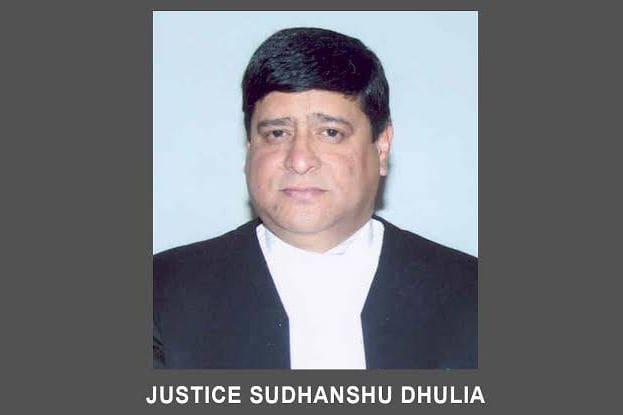
Supreme Court judge Justice Sudhanshu Dhulia in his judgment in Hijab ban case today, strikes down the Karnataka BJP government’s Hijab ban in educational institutions. He said education of girl child most important.
“The High Court took a wrong path. It is ultimately a matter of choice and Article 14 and 19,” he said.
The Supreme Court Thursday delivered a split verdict on petitions challenging the March 15 Karnataka High Court verdict dismissing a batch of pleas filed by Muslim girls studying in pre-university colleges in Udupi seeking right to wear Hijab in classrooms.
Justice Hemant Gupta dismissed the 26 appeals filed against the judgment of the Karnataka High Court which held that hijab was not an essential practice of Islam and allowed the ban on wearing headscarf in educational institutions in the State.
Expressing the divergence in his opinion, Justice Sudhanshu Dhulia set aside the Karnataka High Court judgment and held that the entire concept of essential religious practice was not essential to the dispute.
What Justice Dhulia said:
Justice Dhulia: “The main thrust of my judgment is the entire concept of essential religious practice was not essential to the dispute. The High Court took a wrong path. It is ultimately a matter of choice and Article 14 and 19.”
Justice Dhulia: “It is a matter of choice, nothing more and nothing less.”
Justice Dhulia : The foremost question in my mind was the education of the girl child. Are we making her life any better? That was a question in my mind.
Justice Dhulia : I have quashed the Government Order of February 5 and have ordered the removal of the restrictions.
Justice Dhulia : I have held that the judgment in Bijoe Emmanuel squarely covers the issue.
Justice Dhulia: “Our schools, in particular our Pre-University colleges are the perfect institutions where our children… just waking up to the rich diversity of this nation, need to be counselled and guided, so that they imbibe our constitutional values of tolerance and accommodation, towards those who may speak a different language, eat different food, or even wear different clothes or apparels!… This is the time when they should learn not to be alarmed by our diversity but to rejoice and celebrate this diversity. This is the time when they must realise that in diversity is our strength.”
Justice Dhulia: “School is a public place, yet drawing a parallel between a school and a jail or a military camp, is not correct. Again, if the point which was being made by the High Court was regarding discipline in a school, then that must be accepted. But discipline not at the cost of freedom, not at the cost of dignity…”
Justice Dhulia: “Asking a pre university schoolgirl to take off her hijab at her school gate, is an invasion on her privacy and dignity. It is clearly violative of the Fundamental Right given to her under Article 19(1)(a) and 21 of the Constitution of India. This right to her dignity and her privacy she carries in her person, even inside her school gate or when she is in her classroom. It is still her Fundamental Right, not a ‘derivative right’ as has been described by the High Court.”
Justice Dhulia: ”The School Administration and the State must answer…as to what is more important to them: Education of a girl child or Enforcement of a Dress Code!”
Justice Dhulia: “One of the best sights in India today is of a girl child leaving for her school in the morning, with her school bag on her back. She is our hope, our future. But it is also a fact that it is much more difficult for a girl child to get education, as compared to her brother. In villages and semi urban areas in India, it is commonplace for a girl child to help her mother in her daily chores of cleaning and washing, before she can grab her school bag… This case therefore has also to be seen in the perspective of the challenges already faced by a girl child in reaching her school.”
Justice Dhulia: “Wearing hijab may or may not be a matter of essential religious practice, but it still is, a matter of conscience, belief, and expression. If she wants to wear hijab, even inside her classroom, she cannot be stopped, if it is worn as a matter of her choice, as it may be the only way her conservative family will permit her to go to school, and in those cases, her hijab is her ticket to education.”



